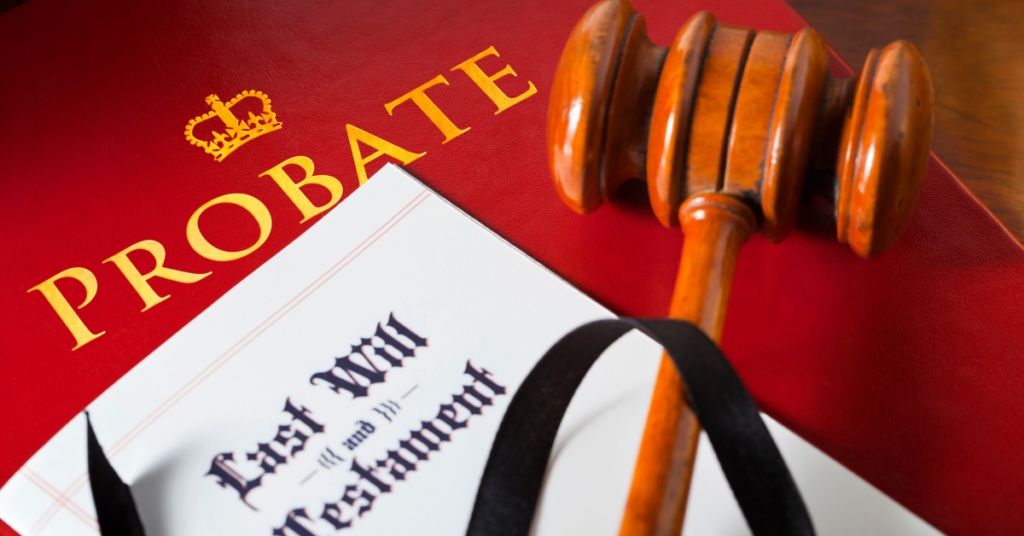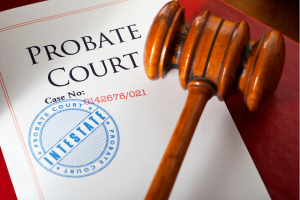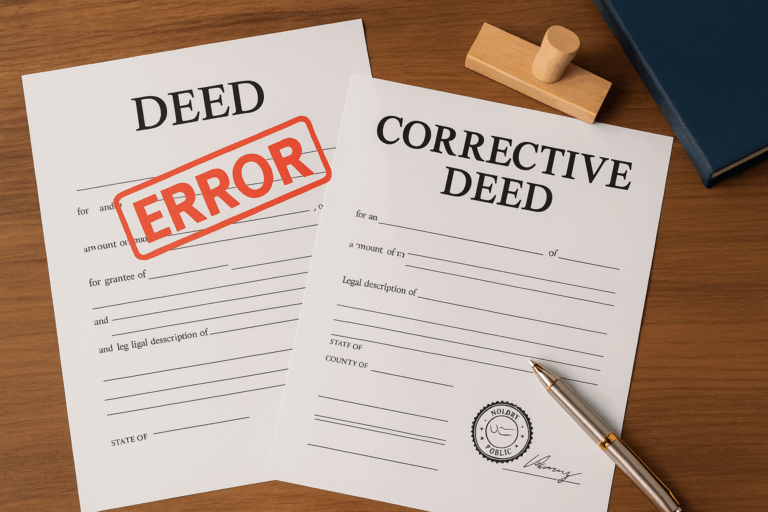Do you need to a deed to transfer ownership in New Jersey after death of an owner?
A deed transfer is necessary to change ownership after the death of an owner to place the property into the name of the rightful heir or beneficiary. The process usually happens through probate, where the court authorizes the executor or administrator to prepare and record the deed. If the property was jointly owned with rights of survivorship, ownership may pass automatically.
This blog is for New Jersey families, heirs, and beneficiaries navigating property after a loved one’s death. It is also valuable for executors, administrators, and personal representatives handling estate matters. Real estate investors, homeowners, and professionals will benefit from understanding probate deeds to avoid costly mistakes and delays.
What is Probate?

Probate is the legal process and procedure of transferring the assets and/or property to beneficiaries or heirs after a death. Laws continue to change over time, so it is important to stay up to date on any changes.
The main purpose of probate is to identify, analyze, and distribute the property of the deceased. The will shall be officially proven as valid in the respective probate court. If there is no will, this process shall still proceed.
The judge is expected to order the executor to proceed with the process of settling the estate. This includes paying outstanding debts and distributing the remaining assets according to the will under duties imposed by N.J.S.A. 3B:10-23, 3B:10-26. If the person passed without a will—called intestate—the court then appoints an executor as established at N.J.S.A. 3B:5-3 through N.J.S.A. 3B:5-14. The assets will be distributed and follow statutory succession rules under N.J.S.A. 3B:5-2 to 3B:5-4.
Practical Tip: When you are entering the probate process, choose a trustworthy, diligent personal representative who understands their obligations to beneficiaries and creditors.
How to Transfer Property After Death

Transferring property after death in New Jersey has multiple steps. Here are the processes to expect throughout the probate process and the transfer of property:
Probate filing
The first step in transferring property after a person passes is probate filing. The executor/administrator of the estate is then formally appointed. They have now received the legal authority to act on behalf of the estate.
Reviewing will or intestacy rules
The will or intestacy rules will be considered after the selection of the executor/administrator. A judge will determine whether the property is distributed to a named beneficiary or heir of the will or the estate as a whole.
Document preparation
Document preparation is the next step in the probate process. The following documents will be processed:
- Property deed – executor/administrator to heir or purchaser of the property
- Affidavit of Consideration – N.J.S.A. 46:15-6 – Note that exemptions may apply for state transfers
- GIT/REP-3 form with the executor’s certification
Deed content requirements
The next step in the probate process consists of the deed content and its respective requirements. The court must identify the grantor, grantee, description, notarization, preparer’s name, and grantee’s mailing address by way of N.J.S.A. 46:26A-3.
This statute establishes mandatory content for deeds such as the lot and block, preparer, and grantee address. Any deeds missing these details will cause NJ clerks to reject the deed upon filing.
Deed Type selected
The type of deed is selected at this level of the process. The most common deed type in probate is the quitclaim deed. This is a legal document that transfers a person’s interest in a property to another party without the validity being guaranteed.
Another type of deed is a bargain-and-sale, a legal document used in real estate transactions that conveys the grantor’s property to the grantee without warranties or guarantees of the title. An additional type of deed is a warranty deed—dependent upon risk tolerance. A warranty deed guarantees the grantor holds a clear title to the decedent’s property and can transfer ownership to the grantee. This protects the grantee against future claims.
Recording the deed
After selection of the deed type, the deed will be submitted to the county clerk or recorder to be recorded. This includes a fee. The recording provides the notice of the transaction and secures priority under New Jersey’s race-notice system according to N.J.S.A. 46:26A-12. New Jersey does allow e-recording for a more streamlined option than mail and paper filings.
Attorney guidance
Deeds must be properly considered before filing and recording. The most common form of deed rejection is due to errors. Having a reputable and trustworthy probate and real estate attorney prevents these errors and potential delays (Branco v. Rodrigues, 476 N.J. Super. 110 (App. Div. 2023).
Mistakes and Pitfalls to Avoid
Transferring property after a death can have its difficulties. It is imperative to know the mistakes and pitfalls to avoid.
Here are several areas to consider when going through the transferring a property:
Breach of fiduciary duty
Executors are expected to follow the rules and guidelines of executor duties in New Jersey. The breach of fiduciary duty can occur when they do not act in the best interests of the estate. Any violation of the trust placed in them can additionally be considered a breach of fiduciary duty.
Executors must avoid self-dealing, conflicts, and negligence. If they are found engaging in these behaviors, the courts have the authority to remove them.
Ignoring will/intestacy rules
Executors must transfer the property to the correct heirs or beneficiaries. If properties are transferred to the wrong heirs or beneficiaries, title defects occur. This can complicate the sale of the property on a future date.
Multiple heirs without agreement
The intestate succession laws in New Jersey dictate the distribution of assets. The surviving spouse or civil union partner maintains the highest priority regarding inheriting the estate. If one heir improperly receives the property, the other heirs have the legal right to contest ownership.
Improperly drafted deed
When deeds are improperly drafted, clerks/recorders can reject them. If errors in execution, acknowledgment, or party names exist, the deed can be rendered void. This also includes fraud, wild deeds, and defective acknowledgments.
Den ex dem. Wooden v. Shotwell, 23 N.J.L. 465 (1852) was a historic precedent case showing fraud and illegality. These deeds are subsequently unenforceable and voided. Fraudulent deeds expose estates and properties to potential litigation and lead to loss.
Phx. Pinelands Corp. v. Davidoff, 467 N.J. Super. 532 (App. Div. 2021) states that courts will reject “wild deeds” as fraud on the recording system. This case determined that title insurers may refuse coverage if deed defects exist and are subsequently rejected by the county clerk. Defective deeds undermine both the title and marketability for future potential sale.
Delay and rejection
It is imperative to hire a knowledgeable attorney to ensure compliance during the transfer of property process. When deeds are rejected at the county clerk’s office, it wastes time and stalls the process.
Creditor Claims
Executors have a legal responsibility to resolve any debts on the property before a property transfer. This legal obligation ensures all debts are rendered settled to the creditors. This protects the estate’s values and additionally the rights of the beneficiaries.
Executors are obligated to use estate assets to pay off remaining debt. If the assets are insufficient, additional assets need to be sold to pay off the debt. If creditors are not notified, they may attach liens to the property.
Affordable Housing Restrictions
Special deed restrictions may trigger foreclosure or forfeiture if ignored. According to the Uniform Housing Affordability Controls under N.J.A.C. 5:80-26.1, et seq, the special deeds that can cause the aforementioned include the following:
- Sale restrictions – Properties are only permitted to be sold to approved low-income families. The sale must be approved by the proper authorities.
- Refinancing restrictions – No refinancing or mortgage obligations may be incurred without prior consent and approval.
- Improvement restrictions – Improvements to the property must be approved prior. They cannot affect the bedroom configuration of any of the dwelling units.
Bottom Line
Transferring property after the death of a loved one can be a complex process. With the right real estate attorney, potential errors and delays can be avoided. Understanding the probate process and the property transfer process is vital to ensure the process goes smoothly. Any missteps may be grounds for denial of the deed and cause issues with the future sale of the property.
An attorney can guide you through the process and help you avoid mistakes and pitfalls that can cause legal issues. Following the proper process ensures the property will be transferred to the correct beneficiaries and heirs based on the will of the decedent or the rules of intestate succession in New Jersey.
FAQs
What happens to the house deed when someone dies?
When a person passes away in New Jersey, the transfer of ownership of the deed depends on a variety of factors. This can include the type of ownership and whether or not a trust or will exists.
The general steps include the following:
- Probate process
- Joint ownership
- Living trust
- Transfer-on-death designation
- Consultation
How long do you have to transfer property after death in New Jersey?
The permitted time to transfer a property after death in New Jersey can vary. If the property holds a joint tenancy with the right of survivorship, the transfer is immediate. If the property is only in the name of the deceased, the estate will go through the probate process. This can take months to a year—or longer. It all depends on the complexity of the estate and any legal challenges that may arise.
Can property stay in a deceased person’s name?
Property cannot stay in the name of the deceased person indefinitely, no. The transfer must be conducted to a living person or entity. This occurs through the probate process.
How do you transfer a deed after death with a will?
Transferring a deed after the passing of a loved one includes several important steps. This includes collecting necessary documents, filing a petition for probate, identifying legal beneficiaries and heirs, settling any remaining debts on the property, and distributing the property based on the specifics of the will or intestate succession—if no will is present.
How do you transfer property after death without a will?
When someone passes away without a will, it is considered intestate succession. The estate is then distributed according to New Jersey state law statutes. The laws determine who inherits the property and usually include the spouse or children of the decedent. If no surviving relatives exist, the estate can escheat to New Jersey.
What is an inheritance deed, and when is it used?
An inheritance deed is utilized when a property owner wants to transfer ownership of their property to a specific beneficiary after they pass away. This estate planning method ensures the property is properly distributed according to the owners’ wishes. This can also avoid the complex and costly probate process.
Can I use a quitclaim deed after the death of a spouse?
Yes, you can use a quitclaim deed after the death of a spouse. This can also depend on the type of deed associated with the estate plans. If held in joint tenancy with rights of survivorship, the surviving spouse typically automatically receives full ownership right away. If the property was only in the decedent’s name or held as tenants in common, probate court may be required.
Do I need a probate lawyer to transfer property estate?
Although it is not mandated to have a probate lawyer to transfer property estate, it is highly recommended. The probate and transferring property process is complex. If errors occur, deeds may get rejected, and time and money are lost. It is recommended to hire probate legal counsel when transferring a property to avoid legal pitfalls and issues that may be harmful to the future sale of the property.
How do you remove a deceased spouse from a house title?
To remove a deceased spouse from the house title, you must go through several steps. These steps include the following:
- Determine ownership type
- Joint tenancy
- Tenants in common
- Gather required documents
- Submit application
- Consult a probate attorney
It is important to proceed in a timely manner as delays can lead to potential complications.
What happens if the property has a mortgage when the owner dies?
If the homeowner passes away and still has debt, the executor of the estate will use the asset to pay off the debt. The heirs cannot receive the property or inheritance until the creditors and debts are paid back in full.
Stay ahead with our free newsletter: The Real Estate Law Newsletter – your source for real estate law news.
Essential updates and insights direct to you. Impress clients and colleagues with trending news. Sharpen expertise. Stay legally compliant. Access free legal forms. Don’t miss out – join today!








